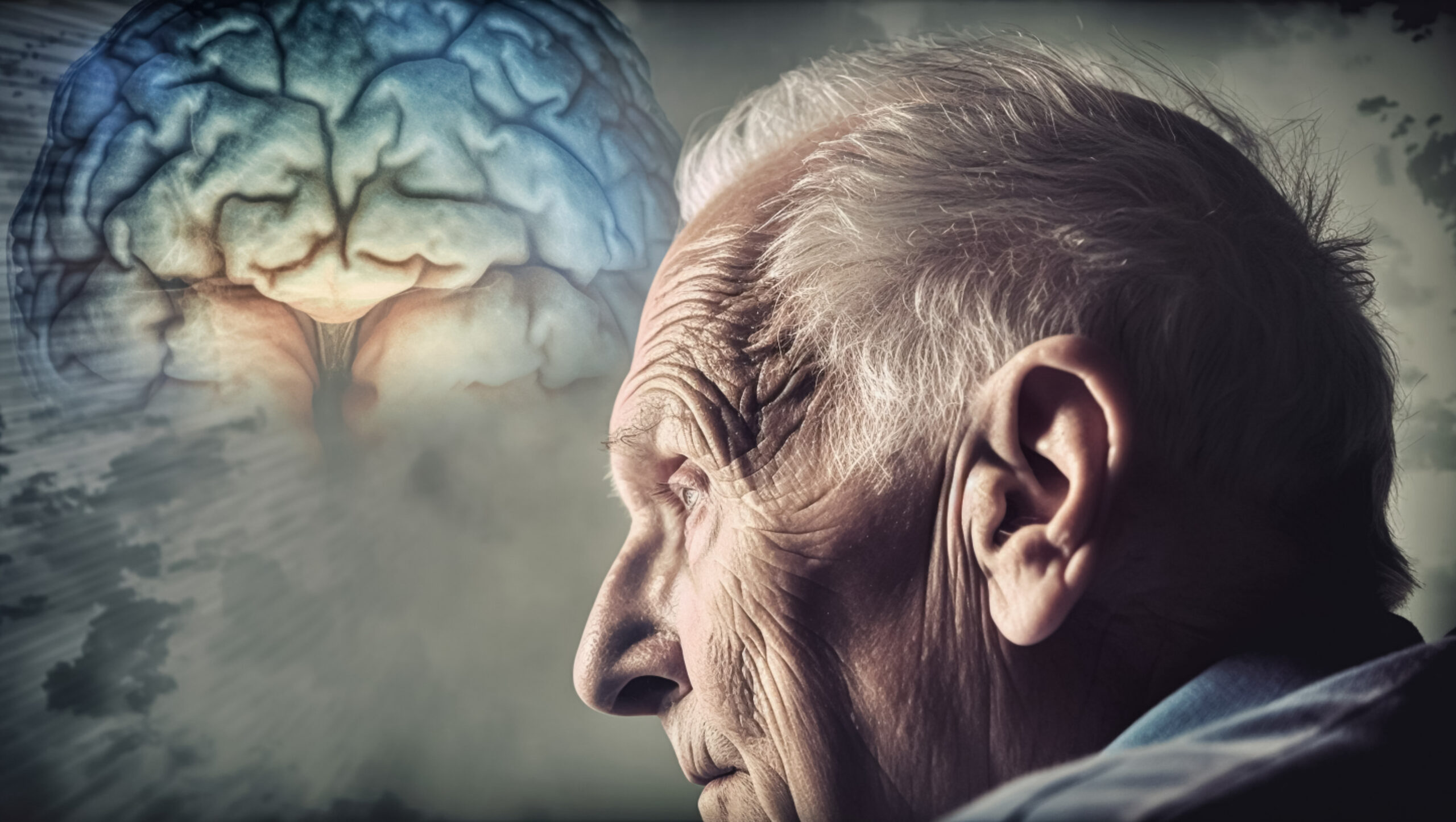Alzheimer's disease is a degenerative brain disease characterized by progressive memory and behavioral disorders, which, over time, prevent the patient from functioning correctly in everyday life, performing work, and disturbing social contacts.
During the disease, proteins with a pathological structure are deposited in the brain. The appearance of these pathological proteins leads to the death of nerve cells. Reducing the number of neurons decreases the amount of transmitter substances they produce, which are necessary for the proper functioning of the brain.

Most cases of Alzheimer's disease are so-called sporadic cases, e.g., not related to family history. The specialists believe that genetic and environmental factors influence the development of the disease. However, it has not been precisely determined which of them impact the development of the disease and to what extent they contribute to it.
The risk of developing Alzheimer's disease increases with age. It occurs more often in women. If there is a family history of dementia, the risk of developing Alzheimer's disease is approximately doubled. The occurrence of diseases such as hypertension, heart failure, and type 2 diabetes, as well as lack of social contact and low physical activity, increases the risk![]() of developing Alzheimer's disease.
of developing Alzheimer's disease.
Disturbing symptoms appear much earlier than dementia itself. If you notice something unusual happening to the memory of an elderly loved one, do not ignore it. Especially when you start finding items belonging to them in strange places more often, e.g., car keys in the trash can or empty cups in the fridge – and these are not isolated cases. These may be the first disease symptoms that progress until the patient loses contact with reality.
Specialists emphasize that the earlier Alzheimer's disease![]() treatment is implemented, the longer the individual will remain relatively fit and independent. It is why it is so important to recognize early symptoms. What is worth paying attention to?
treatment is implemented, the longer the individual will remain relatively fit and independent. It is why it is so important to recognize early symptoms. What is worth paying attention to?
Some skills are retained for longer periods, even when other symptoms worsen. It may involve reading books, reminiscing, singing, listening to music, dancing, drawing, or doing crafts. The longer preservation of specific skills results from the fact that they are responsible for parts of the brain that the disease attacks later.
The course of Alzheimer's disease can be divided into three stages that occur one after the other. It is impossible to predict the disease progression rate in a specific person. The rate of progression of the disorder is different in each patient. The average life expectancy of people with this disease is about ten years. The disease duration appears to be slightly longer in women than in men. The three stages mentioned here are early, middle, and late dementia.
Symptoms of the disease at this stage result from impaired memory of new information and poor concentration of attention. Memory disorders mainly concern memory of currently performed activities. The sick person does not remember where they put their keys or glasses and keeps asking the same questions, not remembering that they have just received an answer.
Mood disorders and personality disorders are sometimes observed at the stage of early dementia![]() . Some patients develop full-blown depression, while others experience only some of its symptoms. Personality disorders manifest themselves by withdrawal from social life, limitation of interpersonal contacts or disrespectful behavior, inappropriate cheerfulness, or irritability. At this stage, a person is still independent in most daily activities and only requires periodic assistance from other people (family or caregiver).
. Some patients develop full-blown depression, while others experience only some of its symptoms. Personality disorders manifest themselves by withdrawal from social life, limitation of interpersonal contacts or disrespectful behavior, inappropriate cheerfulness, or irritability. At this stage, a person is still independent in most daily activities and only requires periodic assistance from other people (family or caregiver).
At the stage of middle dementia![]() , in addition to increasing memory problems, there are also disorders of other cognitive functions, e.g., orientation or speech. Behavioral disturbances and psychotic symptoms may also occur. Patients initially get lost in places that are unfamiliar to them, and as the disease progresses, they also get lost in places that are familiar to them. They have difficulty finding their way home, confusing floors or staircases, and entering their neighbors' apartments. Progressive memory and orientation disorders lead to problems in recognizing the faces of family members.
, in addition to increasing memory problems, there are also disorders of other cognitive functions, e.g., orientation or speech. Behavioral disturbances and psychotic symptoms may also occur. Patients initially get lost in places that are unfamiliar to them, and as the disease progresses, they also get lost in places that are familiar to them. They have difficulty finding their way home, confusing floors or staircases, and entering their neighbors' apartments. Progressive memory and orientation disorders lead to problems in recognizing the faces of family members.
Speech becomes poor in words – these people confuse words or have difficulty finding the right word in a sentence. Behavioral disorders that often occur at this stage of the disease include aggressive behavior, irritability, apathy, and sleep-wake rhythm disturbances (e.g., insomnia at night and naps during the day). Psychotic symptoms are often observed, such as hallucinations, in which patients believe that they see or hear people who are not there. Another symptom is delusions, most often of persecution or marital infidelity. At this stage of the disease, the patient requires constant care from another person.
The disease ultimately makes it impossible to perform all daily activities, such as dressing, preparing meals, using cutlery when eating, communicating with others, and more. Disorientation causes the patient to be unable to distinguish the people around them or the times of day and night. At the late dementia![]() stage of the disease, movement disorders also appear, such as leaning forward and difficulty walking, sometimes causing falls. Gait disorders ultimately result in the patient not getting out of bed and spending the entire day in bed. There are problems with maintaining urine and stool as well as swallowing disorders leading to the destruction of the body (due to insufficient food intake).
stage of the disease, movement disorders also appear, such as leaning forward and difficulty walking, sometimes causing falls. Gait disorders ultimately result in the patient not getting out of bed and spending the entire day in bed. There are problems with maintaining urine and stool as well as swallowing disorders leading to the destruction of the body (due to insufficient food intake).
Any person over 65 who notices a significant decrease in the ability to remember new, meaningful information and difficulties in speaking should consult a doctor, especially if these symptoms do not appear only in stressful situations. People with a family history of dementia should be particularly vigilant in such cases.
Caregivers of patients who have already been diagnosed with dementia and are undergoing treatment should be prompted to revisit a specialist by the appearance of new symptoms or rapid progression of the disease.

The diagnosis is based on a physical examination and a medical interview, as well as with a person close to the patient who can point out symptoms and behavioral changes that are important for the correct diagnosis.
The doctor also assesses cognitive functions using screening tests that allow for the early diagnosis of Alzheimer's dementia.
During the clock drawing test![]() , the patient is asked to draw a clock face on a piece of paper and mark a specific time, 11:10 or 3:00. Failure to perform this task correctly or refusal to do so may be a sign of dementia.
, the patient is asked to draw a clock face on a piece of paper and mark a specific time, 11:10 or 3:00. Failure to perform this task correctly or refusal to do so may be a sign of dementia.
MMSE test![]() contains 30 questions or tasks to be performed; based on the answers, various areas of cognitive functioning are assessed, including reading comprehension, counting, writing, orientation in time and place, memorization, and naming.
contains 30 questions or tasks to be performed; based on the answers, various areas of cognitive functioning are assessed, including reading comprehension, counting, writing, orientation in time and place, memorization, and naming.
MoCA test![]() is a tool for detecting early cognitive impairment, i.e., an intermediate stage between normal cognitive functions and dementia. The test assesses, among others, abstraction, short-term memory, visuospatial and executive functions, language, fluency of expression, allopsychic orientation, and ability to concentrate.
is a tool for detecting early cognitive impairment, i.e., an intermediate stage between normal cognitive functions and dementia. The test assesses, among others, abstraction, short-term memory, visuospatial and executive functions, language, fluency of expression, allopsychic orientation, and ability to concentrate.
The specialist may also order other diagnostic procedures![]() .
.
Positron emission tomography (PET) is a helpful test in early-phase diagnostics that allows indirect visualization of beta-amyloid deposits. Computed tomography (CT) and magnetic resonance imaging (MRI) can help diagnose Alzheimer's and rule out other causes of symptoms or comorbidities.
Blood counts, serum levels of vitamin B12, TSH and folic acid, glucose, and tests for Lyme disease or syphilis are also performed to exclude other diseases that may impair cognitive functions.
Treatment should be long-term and continuous. It must be introduced as early as possible and patients should remain under constant medical supervision. Currently used treatment is only symptomatic, i.e., it does not eliminate the causes of the disease but only combats or alleviates its symptoms.
Drugs![]() are usually used. Treatment should always be carried out under strict medical supervision.
are usually used. Treatment should always be carried out under strict medical supervision.
To improve the cognitive status and clinically slowing symptoms of Alzheimer's disease, in addition to pharmacological treatment, psychological treatment![]() is recommended: cognitive therapy (training memory, orientation in reality), reminiscence therapy (evoking memories using appropriate stimulating stimuli, e.g., photographs, letters, souvenirs), occupational therapy (consolidating skills already possessed by the patient, restoring those that have recently been lost) and environmental (creating a safe and friendly environment for the patient).
is recommended: cognitive therapy (training memory, orientation in reality), reminiscence therapy (evoking memories using appropriate stimulating stimuli, e.g., photographs, letters, souvenirs), occupational therapy (consolidating skills already possessed by the patient, restoring those that have recently been lost) and environmental (creating a safe and friendly environment for the patient).
If the patient suffers from mood disorders or other mental disorders, antidepressants, antipsychotics, and other drugs are used.
The patient requires evaluation by a doctor at least once a year. A patient in the early stages of the disease who drives motor vehicles requires evaluation at least once every six months.
Treatment does not lead to recovery and may only reduce the rate and severity of symptoms. Treatment should not be interrupted. It must be continued for the rest of the patient's life.
Alzheimer's disease affects not only the patient but also everyone in the household. To make it easier to cope with the disease, it is worth implementing by caregivers several actions:

Accompaniment in illness is primarily:
The source of many difficulties in caring for a patient with dementia is the deterioration of the ability to communicate with each other. It is difficult to understand what a sick person needs or to obtain the necessary information regarding their will or needs. Much in such a situation may depend on the practical application of guidelines for verbal and non-verbal communication![]() . However, you can learn what to pay special attention to when contacting a patient to make it easier for you to take care of yourself and for the patient to function better.
. However, you can learn what to pay special attention to when contacting a patient to make it easier for you to take care of yourself and for the patient to function better.
As the disease progresses, the ability to communicate with the environment gradually deteriorates. The patient begins to have trouble expressing what they would like to say, forgets the names of objects, does not finish sentences, and repeats the same information many times.
As time passes, the patient expresses themself less and less coherently, and the caregiver must guess what the sick person means. When trying to communicate, the caregiver also notices that they are not understood by the patient. They do not receive answers to their questions or they make no sense. The inability to communicate is challenging for both parties and can turn into mutual frustration. It may cause hyperactivity and aggression in the patient. Caring for a patient with dementia requires great patience, understanding, and the ability to listen carefully.
In case of problems with speaking, stimulation of language activity is significant, i.e., encouraging conversation on topics accessible to the patient, e.g., memories from the past.
Create appropriate conditions for conversation, without noise and excess stimuli, with the radio and TV turned off and the door or window closed.
When talking, stand in front of the patient (face to face) and try to maintain eye and touch contact: